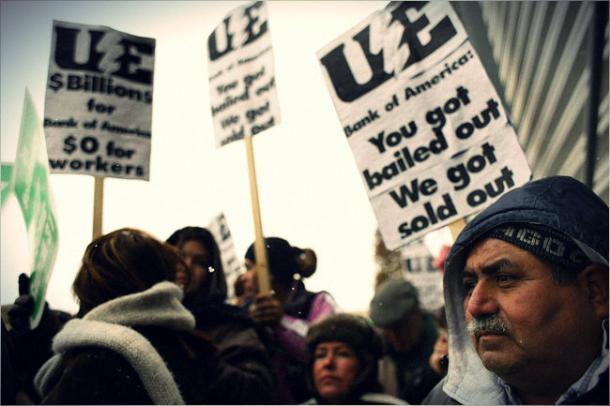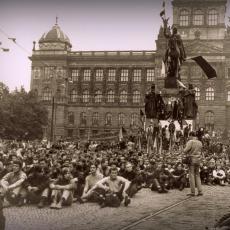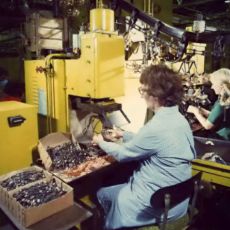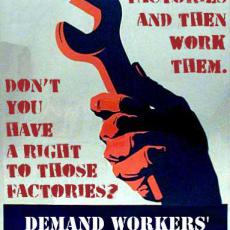Worker Direct Action Grows in Global North in Wake of Financial Meltdown
The wave of factory occupations continuing through 2009 may represent only the beginning of a broader sit-down movement throughout the world, and, following examples in Latin America, demands for work
The traditional path of labor-management collective bargaining has taken a dramatic turn in an era in which unions are too weak or timid to take action even as joblessness grows and companies losing financing are forced into bankruptcy by their creditors. As plants close and layoffs grow—and as workers recognize they can no longer interrupt the workflow with a strike when there is no flow to be interrupted—they are engaging in militant action to save their jobs and livelihoods.
Over the last decade sit-down strikes were largely confined to Latin America and elsewhere in the global South, where workers occupied factories in response to economic collapse. But the tide of direct action by workers and some unions seems to be moving north. Workers in the global North are now engaging in a wave of factory occupations and other militant actions. Many of these actions are in the syndicalist tradition of workers directly taking power; in some cases workers are acting on their own, in others they are leading lackadaisical unions to support their efforts. The current crisis in manufacturing has rendered a growing number of officially-recognized unions with government-sanctioned collective bargaining agreements nearly helpless and could lay the basis for escalating direct actions by workers, possibly ushering in a more militant union movement.
In the United States and much of Europe, worker radicalism was in check for decades even as unions repeatedly offered up concessions to managers, ostensibly to save their factories. While workers have been viewed by corporate managers as docile and weak-willed, “when workers are threatened by management they seriously consider breaking the rules and fighting back,” according to auto worker and activist Gregg Shotwell.
Shotwell, who worked at the Delphi auto parts plant in Flint, Mich., is a founder of Soldiers of Solidarity (SOS), a rank-and-file association that continues to resist United Auto Workers (UAW) policies of concessionary bargaining that have all but destroyed a way of life for unionized manufacturing workers in the United States. SOS formed as a worker insurgency in November 2005 following Delphi’s bankruptcy filing and the union leadership’s lackluster response. Workers at Delphi plants throughout the Midwest feared the worst—plant closures and abrogation of health and pension benefit agreements that were guaranteed after the auto parts unit was spun off by GM in 1999. Independent of the UAW, they waged a mass “work to rule” campaign as a means of sabotaging the company’s plans for mass layoffs.
The 2005-2006 insurgency at Delphi was not a replay of the storied 1936-1937 Flint sit-down strike. Still, through deftly organized slow-downs and direct action on the shop floor (for instance, simply not fixing machines, thereby slowing the production process—known as “putting machines down”), and without the support of the UAW, the Delphi workers saved their health benefits and pensions. Says Shotwell, “A sit-down strike will not come out of a political philosophy, but will occur when workers feel they will lose everything if they stay complacent and take no action.”
The global capitalist economic crisis that began in 2007 is unquestionably creating the kinds of conditions Shotwell describes for an increasing number of workers. This crisis has led to the devaluation of labor-management contracts that purportedly exchanged labor peace for decent wage and benefit standards and a modicum of job security. The closure of manufacturing plants in North America and Europe has swelled the ranks of distressed, frequently older, workers seeking to preserve the economic security they once took for granted. As welfare-state-based guaranteed benefits and unemployment insurance have been eroded since the 1980s thanks to the rise of neoliberalism, workers have been forced to rely on employer- or union-based benefits. However, in the last year, the economic collapse has exposed the failure of neoliberal capitalism to ensure economic security through either public or private avenues.
While we have yet to witness the recurrence of factory takeovers on a scale akin to the Italian Biennio-Rosso (“Red Years”) of 1919-1920, when some 500,000 factory workers seized and operated factories, mostly without official union sanction, today a resurgence of rank-and-file militancy palpable. Just in the last year, a growing number of workers who had until recently been viewed as conservative and quiescent have begun to take matters into their own hands, engaging in the most militant of activities.
In the United States, the Republic Window and Door sit-down strike in Chicago in December 2008 and the threatened factory occupation of Hartmarx, the men’s suit manufacturer based in Des Plaines, Ill., in May 2009, have received considerable attention. At Republic the occupation got the workers the back pay and other benefits they were owed; at Hartmarx, where workers had the support of their union, the new SEIU affiliate Workers United, a threatened sit-down helped save some 3,000 jobs.
Notably, in both of these cases, workers took on the banks and creditors who sought to liquidate the firms in order to enhance their own balance sheets. Their move to demand accountability not only from their direct employers but also from financial firms, including some that had received government bailouts, strengthened their case and brought added attention to their struggle. If creditors and manufacturers continue a pattern of arbitrarily shutting profitable firms to improve their financial ratings, it is likely that a wave of worker factory occupations could occur in the United States.
But it is in Europe that the new militancy is already most pronounced. Varied repertoires of direct action are emerging in different countries, from factory occupations in Britain and Ireland to “bossnappings” in France.
During the first six months of 2009, Unite, the UK’s largest trade union, representing nearly 2 million members, reported that employers laid off over 94,000 members. Formed in 2007 through a merger of the Transport and General Workers Union and Amicus, Unite represents workers across many industries, from finance to manufacturing.
As the global economic crisis has erupted, Unite has fought mass layoffs while publicly resisting corporate efforts to abuse the so-called redundancy system when going into bankruptcy. According to the 1965 Redundancy Payments Act, UK workers with at least two years of service are entitled to a severance payment from their employer. The formula for these payments is based on a number of factors such as age and length of service. The law’s provision for financial compensation for laid-off workers, combined with the fact that many employers agreed to provide larger severance packages than the law required, resulted in a drop in worker resistance to mass layoffs. In the ensuing years, the average number of days lost through strikes against mass layoffs in all industries dropped—from 161,744 a year from 1960 to 1965, to 74,473 a year from 1966 to 1969.
However, more recently companies have instead been offering the legal minimum or else going into bankruptcy, in which case plants land in state receivership (“administration”); the state then assumes responsibility for the severance payments. When companies follow this latter strategy, it presents a number of problems for both workers and the economy. The state severance payments come out of a Redundancy Fund financed by a surcharge on the National Insurance Tax, with limits on how much an individual can be paid from that fund. In addition, workers who are forced into a state-funded severance plan lose any pension or other entitlements earned from their term of service.
These were the issues in play this spring, when workers represented by Unite occupied three Visteon auto parts plants in Britain and Ireland—by far the most significant among the recent sit-downs in Europe due to the extensive public support they received and their potential to erupt into a broader movement among workers.
Visteon makes parts for Ford, which spun the parts division off in 2000, one year after GM spun off Delphi. At the time, Ford promised that its wage, pension, and other benefits obligations would be honored by Visteon. Still, many workers viewed these moves as attempts by the auto companies to rid themselves of pension obligations to a segment of their workforce.
On March 31, 2009, workers at Visteon’s Belfast plant were given six minutes notice that their services were no longer needed. Stunned by Visteon’s arrogance in closing the plant without notice and management’s failure to consult workers in any manner, the workers seized control of the plant. Roger Madison, automotive spokesperson for Unite, commented, “Once again we see how cheap and easy it is to sack UK workers. One minute they were working, but six minutes later they were jobless, pensionless, and looking at the state basic in redundancy pay as their company was placed into [bankruptcy receivership].”
Following the Belfast sit-down, workers also occupied Visteon’s Basildon and Enfield plants. The arbitrary and abrupt nature of Visteon’s mass layoffs traumatized veteran workers. Paul Walker, who had worked at the parts plant in Enfield for 24 years, said the workers wanted to stand firm against global corporations that seek profits at the expense of employees. “This demonstration is to protest how these international companies have treated us. … We were given six minutes to leave the building, immediate redundancy and that’s it. So, we’re here for justice for ourselves.”
Walker was also struck by how Visteon’s abusive treatment developed his working-class consciousness. “It’s funny, I was just a worker before. I came to work, I went home. I really didn’t pay much attention to anything, but my eyes have been opened up. I think that right now is the right time for this [sit-down strike].”
Visteon had set out to rid itself of nearly 600 workers from the three plants. However, the workers’ action forced Visteon and Ford back to the negotiating table. “If we would have walked out, we would have never have gotten [this] far,” observed Charlie Maxwell, a Unite representative. The occupations continued for seven weeks when finally members of Unite voted to accept a settlement involving Ford which, according to Madison, was “ten times what people were being offered originally.” Visteon agreed to a severance of between six and eighteen months’ salary.
The Visteon actions were coordinated and supported by the union to a significantly greater extent than in most other recent cases of militant worker action. They also garnered significant community support, with supporters holding rallies and picketing Ford dealerships throughout Britain and Northern Ireland. Worker and community solidarity was considered the most crucial factor in reaching a settlement at Visteon. At Enfield, the sit-down strike was supported by mass labor and community demonstrations which, according to Ron Clarke, a worker at Enfield, were crucial for the success of the strike: “It took a lot of organizing, but the solidarity of the membership and the people that work [at Enfield] was incredible. It gathered momentum. There was so much support from outside.”
The Visteon sit-downs and protests sent shudders through corporate and government leaders in the United States and Europe, who feared they might lead to a militant workers’ movement, forcing corporations to take into account the economic and social rights of laid-off employees. On April 28, 2009, the corporate human resources journal Personneltoday.com posted a warning that “employers should beware—if successful today, Visteon workers stand to set a very public and very dangerous precedent. … [T]he sheer determination of the workers surely stands as a testament to the lengths employees are now willing to go to secure what they believe is a ‘fair deal’ when they have nothing left to lose.”
Among the other companies in Great Britain and Ireland that have been the targets of militant worker action are auto parts maker Calcast, Waterford Crystal, and Prisme Packaging.
With its skilled labor force and relatively lower wages, Ireland was considered Europe’s economic dynamo over the last decade. Now Irish workers facing plant closures have carried out a number of sit-down strikes. In November 2008, Calcast, a subsidiary of the French auto parts manufacturer Montupet SA which produces parts for Audi, Ford, Peugeot, and Renault, announced it was shutting down its plant in Derry and laying off 90 of 102 workers employed there, with the remaining twelve redeployed in jobs elsewhere. Montrupet’s plans to close the plant were evident even before the financial meltdown. In August 2008 the company announced plans to move its manufacturing toRuse, Bulgaria, which was slated to become the firm’s primary European factory for auto parts.
After management offered severance packages below what it had previously agreed to, the workers occupied the plant, vowing not to leave until better terms were offered. The sit-in had lasted 72 hours when management made a new offer, which the union membership accepted.
In January 2009 another sit-down strike broke out at the Waterford Crystal Factory in Kilbarry, which employed some 700 workers, including nearly 500 factory workers. Waterford workers were not told directly of the plans for a closure, but only found out after it was leaked that a creditor was imminently planning to close the plant. When workers learned of the creditor’s plans, they forced their way into Waterford’s Visitors Centre and occupied the building, setting up a rotating shift system in which some 50 to 60 workers controlled the factory at any given time. The following week, thousands of workers, trade unionists, and community allies massed in rallies in the city of Waterford demanding that the plant remain open.
Two major U.S. corporations contended for ownership of the company. One was Clarion Capital, which sought a concessionary pact to reemploy workers at much lower wages and inferior conditions. KPS, the second bidder, had no interest in operating the facility; it was only interested in maintaining Waterford’s brand names, product designs, and manufacturing processes. With ongoing financial problems in the company, a significant number of workers were prepared to accept a lay-off. But the closure threatened not only 700 jobs but also the workers’ severance payments. The Waterford occupation ended on March 23, when KPS gained control over the company and promised to keep 176 workers. The victory was only partial—while workers gained an additional redundancy payment, the agreement did not prevent Waterford from laying off most of the workers at the plant.
Since the company was in bankruptcy, those workers who lost their jobs would have received the basic national statutory payment for loss of work, rather than the company-promised severance package. KPS offered a 10 million Euro severance package to some 800 workers, including those who had lost their jobs even before the plant closure. This package replaces the company pensions, since Ireland has no pension protection plan for laid-off workers. One worker said: “On the pensions, everyone has been talking hard but little has really been done. It’ll end up in the European courts—which is fine except that people need their pensions today.”
Unite, which represented Waterford’s laid-off workers, did not press the Irish government to nationalize the plant, but assisted in the process of identifying a private buyer. Even after the buyout, rank-and-file workers maintained the necessity of resisting the layoffs, with or without the union. The Waterford strike helped lay the basis for the Irish Congress of Trade Unions (ICTU) and Unite to call a one day solidarity strike and demonstration on March 30. Strikers and protesters demanded that private and public employers honor the Irish National Wage Agreement, which requires firms to adjust wages to the inflation rate, and protested mass layoffs and Ireland’s lack of protection for worker pension plans. The ICTU contends that the Irish government is in “non-compliance with European legislation on pension protection.”
Dundee, Scotland was the site of a sit-down strike in March 2009. A small group of 12 workers occupied the Prisme Packaging factory near the city center to force their employer to pay legally required severance payments, following the company’s decision to lay off its entire workforce. The workers had been given one hour’s notice that the firm was closing. But after receiving notification that the company was planning to withhold severance pay, holiday pay, and backwages, the seven women and five men decided to take control of the factory to prevent the company from removing potentially valuable materials and equipment.
After a 51-day occupation and significant support from the surrounding community in southeastern Scotland, the managing director of Prisme resigned and plans for an independent worker-managed cooperative went into effect. On May 1, Discovery Packaging and Design, Ltd., opened for business with the support of the community and private donations.
In France worker demands are even more militant than in Britain and Ireland, as workers are demanding that employers keep factories open and challenging owner claims as to the financial viability of firms. Worker direct action has extended beyond occupying factories to blocking roads and to holding factory owners hostage in what have become known as “bossnappings.”
Beginning on February 24, 2009, workers at FCI Microconnections, an electronics manufacturer in Mantes-la-Jolie, demanded that management guarantee the future of the plant. Workers believed the company was formulating a plan for mass layoffs. After FCI denied having any layoff plan, over half of the plant’s 400 workers went on strike and occupied the factory, preventing any removal of equipment. The occupation continued for the next seven weeks, even after the French government issued a legal order on March 26 for to the workers to end the sit-down strike. Workers intensified the pressure on management to keep the plant open by traveling to the company headquarters in Versailles, where they set up a barricade preventing the chief executive and corporate staff from leaving for four hours.
While management continued to insist no closure was planned, CGT, the union representing the workers, produced an internal document showing that FCI had developed a detailed plant-closure plan for November 2009. After the company’s plans were revealed and management finally agreed to negotiate the facility’s future, striking workers gained greater support from the non-striking workers. A week later negotiations between the CGT and CFDT unions and management culminated in an agreement guaranteeing that the factory will remain open until 2014 with no job cuts before 2011. FCI workers also won payment for 27 of their 34 strike days.
On Friday, March 6, 300 workers at a Goss International plant in Nantes were informed that the newspaper printing machine plant was to be closed and operations transferred to its factory in Montataire, north of Paris. Goss told workers that due to the “financial crisis,” downsizing measures were necessary. However, since the plant had experienced rapid growth in production capacity in the preceding 14 years, the workers, in disbelief, insisted that it remain open and that the plant manager, who had refused to order the closure, be reinstated by the company. The occupation lasted for five days, until Goss offered assurances that certain operations at the plant could be maintained and that they would fight to save “as many jobs as possible.”
Jean Luc Bonneau, a delegate of the French trade union CFDT, claims that the site is “viable” due to its earnings of “€50 million in dividends to shareholders” in the last five years. According to Bonneau, the “closure has no justification.” In fact, the decision to close the factory at Nantes was made by its ownership MatlinPatterson Global Opportunities Partners, which intends to sell off the entire company to raise cash for new investments in “distressed” businesses. MatlinPatterson is one of the leading “vulture funds” that specialize in buying financially weak businesses and selling them off at a high margin after restructuring. The fate of the Goss workers had little to do with the “financial crisis” and everything to do with higher profitability in other markets.
In late March 2009, workers at a Caterpillar plant in the French Alps briefly held five managers captive in a dispute over severance packages. The incident was the third time in three weeks that French Caterpillar workers had detained their bosses to protest job losses. After announcing 22,000 job cuts worldwide in January and February, Caterpillar sought to lay off 733 workers—about a quarter of the workforce—at its factories in the towns of Grenoble and Échirolles. Combined with those already laid off and those whose short-term contracts would not be renewed, a total of about 1,000 workers at the French factories were losing their jobs.
Pierre Piccarreta, a CGT union representative, called the actions an effort to apply “pressure” so as to “restart negotiations.” He also added, “At a time when the company is making a profit and distributing dividends to shareholders, we want to find a favorable outcome for all the workers and know as quickly as possible where we are going.”
The Caterpillar “bossnappings” seemed to inspire other frustrated workers. In the following weeks workers held a 3M executive overnight, forcing management to discuss job cuts. Workers at Sony’s French division held a chief executive and director of human relations for a day. Two managers from a Kleber-Michelin machine-parts factory in Toul were also locked up and held by workers demanding negotiations over lay-offs.
These acts of worker resistance are on the rise globally as millions of workers feel anger at corporations that are seemingly using the current financial crisis as a cover for laying off long-term workers and restructuring labor markets through plant relocations and wage cuts. Unite, which itself is under financial stress, has held events to call attention to the need to reform Britain’s redundancy laws to prevent employers from using bankruptcy as a means of circumventing severance pay.
The worker actions in Europe represent working-class resistance to employers who arbitrarily shut down plants without the participation of employees. In South America, factory workers have taken the next step by demanding workers’ right to control plants that have been shut down by their owners. In Argentina and Venezuela, workers, who have operated some factories without corporate managers for nearly a decade, are demanding that their governments pass legislation legitimizing the expropriation of factories under worker control.
Under the pretext of the financial crisis, finance capitalists are determined to unload the debt burden off their books, and multinational corporations are closing factories to take advantage of lower-wage workers on a global basis. In response, a growing number of workers vulnerable to layoffs across Europe and North America both within and outside of unions are now resisting closures through sit-down strikes and other forms of direct action. Where unions are unwilling to resist the corporate assault on labor, militant workers are engaging in direct action through factory occupations and mass insurrections demanding that plants be reopened or lay-off benefits improved. The wave of factory occupations continuing through 2009 may represent only the beginning of a broader sit-down movement throughout the world, and, following examples in Latin America, demands for worker control over factories.






Comments
Post new comment